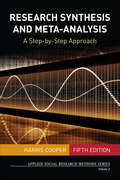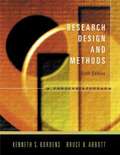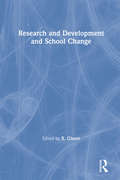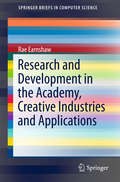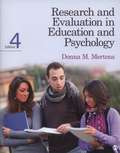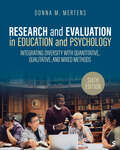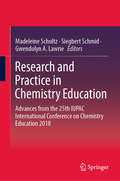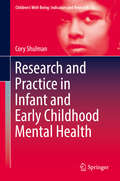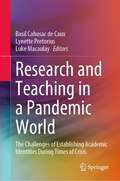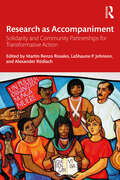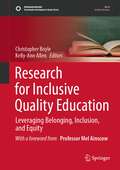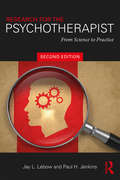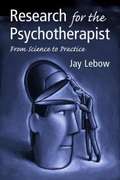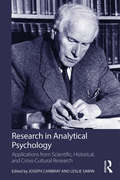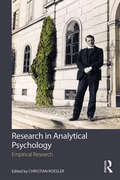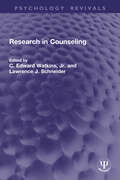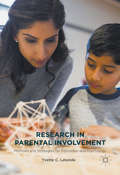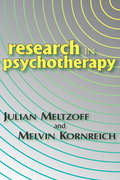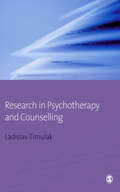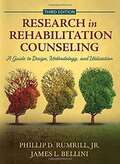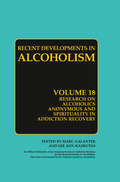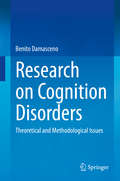- Table View
- List View
Research Synthesis and Meta-Analysis: A Step-by-Step Approach (Applied Social Research Methods #2)
by Harris CooperThe Fifth Edition of Harris Cooper′s bestselling text offers practical advice on how to conduct a synthesis of research in the social, behavioral, and health sciences. The book is written in plain language with four running examples drawn from psychology, education, and health science. With ample coverage of literature searching and the technical aspects of meta-analysis, this one-of-a-kind book applies the basic principles of sound data gathering to the task of producing a comprehensive assessment of existing research.
Research Synthesis and Meta-Analysis: A Step-by-Step Approach (Applied Social Research Methods #2)
by Harris CooperThe Fifth Edition of Harris Cooper′s bestselling text offers practical advice on how to conduct a synthesis of research in the social, behavioral, and health sciences. The book is written in plain language with four running examples drawn from psychology, education, and health science. With ample coverage of literature searching and the technical aspects of meta-analysis, this one-of-a-kind book applies the basic principles of sound data gathering to the task of producing a comprehensive assessment of existing research.
Research and Design Methods
by Kenneth S. Bordens Bruce B. AbbottA textbook about researching and designing psychological studies and experiments.
Research and Development and School Change
by Benjamin S. Bloom; Joseph M. Cronin; Robert M. Gagné; Jacob W. Getzels; Wayne H. Holtzman; Wesley W. Posvar; Alberta E. Siegel; Ralph W. Tyler; Robert GlaserFirst published in 1983. The essays in this book are based on papers presented at a symposium held in March 1976 at the Learning and Development Center (LRDC), University of Pittsburgh. It was planned to serve three purposes: to pay tribute to retiring chairman Ralph W. Tyler, to mark the dedication of LRDC's new buiding and to provide an opportunity for those involved in research and development to reflect further on its implications for school change.
Research and Development in the Academy, Creative Industries and Applications
by Rae EarnshawThis book examines how creativity feeds through into typical application areas, and the lessons that can be learned from this. A number of Case Studies in creative and general application domains are included which illustrate how the academy and industry can collaborate to mutual benefit and advantage. It also examines the pros and cons of the collaboration, and what lessons can be learned from successes or failures in aspects of the implementation and delivery. The academy has played a key role in the past in the research and development of key ideas and patents that have been migrated into successful industrial products and services and continues to do so. A variety of models of interaction between the academy and industry have been developed depending on the circumstances of the institution, its mission, its values, its expertise, and its relationship to the local and cultural environment in which it is situated. These models are reviewed and evaluated. The process of initial idea through to design and successful implementation is a pipeline. If this process requires the involvement of technology (as is more often the case - as creative applications are increasingly dependent on technology) then there is need to understand how this can efficiently and optimally be done. A number of factors tend to be generic and permeate many application areas (such as bandwidth requirements, use of colour, interaction methods) whilst others are more customized with specialist hardware and software (e. g. shared virtual environments, augmented reality).
Research and Evaluation in Education and Psychology (Fourth Edition)
by Donna M. MertensFocused on increasing the credibility of research and evaluation, the Fourth Edition of Donna M. Mertens's comprehensive Research and Evaluation in Education and Psychology: Integrating Diversity with Quantitative, Qualitative, and Mixed Methods incorporates the viewpoints of various research paradigms into its descriptions of these methods. Providing specific advice on conducting research in culturally complex communities, the new edition has been updated to align with the American Psychological Association and the National Council of Accreditation of Teacher Education accreditation requirements. Approximately sixty percent of the content in the Fourth Edition is new, updated with numerous contemporary examples, making this book one of the most comprehensive, accessible, and practical methods books available.
Research and Evaluation in Education and Psychology: Integrating Diversity With Quantitative, Qualitative, and Mixed Methods
by Donna M. MertensIdentify, evaluate, and practice good research using Research and Evaluation in Education and Psychology: Integrating Diversity With Quantitative, Qualitative, and Mixed Methods by renowned scholar Donna M. Mertens. This introductory research methods text incorporates the viewpoints of various research paradigms into its descriptions of qualitative, quantitative, and mixed methods as well as program evaluation. The work covers five major paradigms: post-positivist, constructivist, transformative, pragmatic, and Indigenous. Special emphasis on conducting research with culturally complex communities, based on the perspectives of feminists, ethnic/racial minorities, and people with disabilities is a hallmark of this text. In each chapter, the author carefully explains each step of the research process, from the literature review to analysis and reporting. Additionally, each chapter includes a published sample study and abstract to illustrate the concepts discussed in that chapter. The Sixth Edition includes more on community engagement, recent advances in mixed methods, new applications of theoretical frameworks, and the latest research examples. Citations and references have all been updated to reflect the seventh edition of the Publication Manual of the American Psychological Association. Included with this title: LMS Cartridge: Import this title’s instructor resources into your school’s learning management system (LMS) and save time. Don’t use an LMS? You can still access all of the same online resources for this title via the password-protected Instructor Resource Site.
Research and Evaluation in Education and Psychology: Integrating Diversity With Quantitative, Qualitative, and Mixed Methods
by Donna M. MertensIdentify, evaluate, and practice good research using Research and Evaluation in Education and Psychology: Integrating Diversity With Quantitative, Qualitative, and Mixed Methods by renowned scholar Donna M. Mertens. This introductory research methods text incorporates the viewpoints of various research paradigms into its descriptions of qualitative, quantitative, and mixed methods as well as program evaluation. The work covers five major paradigms: post-positivist, constructivist, transformative, pragmatic, and Indigenous. Special emphasis on conducting research with culturally complex communities, based on the perspectives of feminists, ethnic/racial minorities, and people with disabilities is a hallmark of this text. In each chapter, the author carefully explains each step of the research process, from the literature review to analysis and reporting. Additionally, each chapter includes a published sample study and abstract to illustrate the concepts discussed in that chapter. The Sixth Edition includes more on community engagement, recent advances in mixed methods, new applications of theoretical frameworks, and the latest research examples. Citations and references have all been updated to reflect the seventh edition of the Publication Manual of the American Psychological Association. Included with this title: LMS Cartridge: Import this title’s instructor resources into your school’s learning management system (LMS) and save time. Don’t use an LMS? You can still access all of the same online resources for this title via the password-protected Instructor Resource Site.
Research and Practice in Chemistry Education: Advances from the 25th IUPAC International Conference on Chemistry Education 2018
by Siegbert Schmid Madeleine Schultz Gwendolyn A. LawrieThis book brings together fifteen contributions from presenters at the 25th IUPAC International Conference on Chemistry Education 2018, held in Sydney. Written by a highly diverse group of chemistry educators working within different national and institutional contexts with the common goal of improving student learning, the book presents research in multiple facets of the cutting edge of chemistry education, offering insights into the application of learning theories in chemistry combined with practical experience in implementing teaching strategies. The chapters are arranged according to the themes novel pedagogies, dynamic teaching environments, new approaches in assessment and professional skills – each of which is of substantial current interest to the science education communities.Providing an overview of contemporary practice, this book helps improve student learning outcomes. Many of the teaching strategies presented are transferable to other disciplines and are of great interest to the global community of tertiary chemistry educators as well as readers in the areas of secondary STEM education and other disciplines.
Research and Practice in Infant and Early Childhood Mental Health
by Cory ShulmanThis book examines infant and early childhood mental health and the importance of early emotional and social development for later developmental trajectories. It incorporates research and clinical perspectives and brings research findings to bear in evaluating intervention strategies. By incorporating empirical developmental literature that is directly relevant to infant mental health and clinical practice, the book addresses the multiple forces which shape young children's mental health. These forces include child factors, parental and familial variables, childrearing practices, and environmental influences. In addition, the book explores parent-child relationships, family networks, and social supports as protective factors, as well as risk factors such as poverty, exposure to violence, and substance abuse, which influence and change developmental processes. It shows that, by examining socio-emotional development in a cultural context, human development in the twenty-first century can be conceptualized through differences, similarities and diversity perspectives, focusing on the rights of every individual child.
Research and Teaching in a Pandemic World: The Challenges of Establishing Academic Identities During Times of Crisis
by Lynette Pretorius Luke Macaulay Basil Cahusac de CauxThis book adopts collaborative autoethnography as its methodology, and presents the collective witnessing of experiences of the COVID-19 pandemic within the higher education sector. Through the presentation of staff and student experiences and what was learnt from them, the authors examine the global phenomenon that is the COVID-19 pandemic through the purposeful exploration of their own experiences. This book presents an overall argument about the state of higher education in the middle of the pandemic and highlights academic issues and region-specific challenges. The reflections presented in this book offer insights for other staff and students, as well as academic policy-makers, regarding the pandemic experiences of those within academia. It also offers practical suggestions as to how we as a global community can move forward post-pandemic.
Research as Accompaniment: Solidarity and Community Partnerships for Transformative Action
by Alexander Rödlach Martín Renzo Rosales LaShaune P. JohnsonThis volume expands conversations about participatory, community-engaged, and action-oriented research that inspires social change.The authors contend that long-term community partnerships, inspired by solidarity and characterized by equality and reciprocity, result in a deep understanding of community concerns and increase the likelihood that research findings will have an impact on both the community partners and the broader society. Such research relationships, the authors maintain, are best understood as accompaniment. This book recognizes the potential as well as constraints of conceptualizing research as accompaniment and emphasizes that this approach is both a continuum and a process.Suitable for students and scholars of ethnographic and qualitative methods (and professionals using those methods, such as those in non-government organizations), it will appeal to those interested in research with communities in a wide variety of social science and other disciplines, including anthropology, nursing, and public health, amongst others.
Research for Inclusive Quality Education: Leveraging Belonging, Inclusion, and Equity (Sustainable Development Goals Series)
by Christopher Boyle Kelly-Ann AllenThis book explores contemporary perspectives and research on inclusion, providing a platform for discussing inclusion at an international level and its intersections with belonging and equity. How inclusion is defined and applied between schools, districts, and even countries can vary markedly; thus, an international understanding of inclusion is urgently needed. Experts from several countries in different regions present the latest research in the field of inclusion and provide practices and strategies guided by empirical research to address some of these issues. Schools are contextual organisations that represent the broader society, culture, and values in which they reside. Thus, how inclusion is practised at the society level has an implication on schools. The way we think about inclusion has shifted dramatically in the last decade - we now recognise that inclusion represents a broad spectrum of racial, ethnic, cultural, and sexual diversity that is seen in almost all modern schools. This book presents international perspectives and research on inclusion, belonging and equity to work towards a more consistent, collaborative, and global understanding.
Research for the Psychotherapist: From Science to Practice
by Jay L. Lebow Paul H. JenkinsWhile empirical, scientific research has much to offer to the practice-oriented therapist in training, it is often difficult to effectively engage the trainee, beginning practitioner, or graduate student in the subject of research. This fully revised and expanded edition of Research for the Psychotherapist is an engaging, accessible guide that bridges the gap between gathering, analyzing, presenting, and discussing research and incorporating that research into practice. The authors present concise chapters that distill research findings and clearly apply them to practical issues, while also helping readers progress as consumers of relevant research.
Research for the Psychotherapist: From Science to Practice
by Jay LebowJay Lebow is an accomplished practitioner and researcher in the fields of marriage and family therapy and integrative psychotherapy. In this book, he offers a focused volume that covers a range of topics. This volume should appeal to psychotherapists and students looking for an accessible, jargon-free guide to utilizing research in practical settings.
Research in Analytical Psychology: Applications from Scientific, Historical, and Cross-Cultural Research
by Joseph Cambray Leslie SawinResearch in Analytical Psychology: Applications from Scientific, Historical, and Cross-Cultural Research is a unique collection of chapters from an international selection of contributors, reflecting the contemporary field of research in Analytical Psychology with a focus on qualitative and mixed-methods research. Presented in seven parts, this volume offers unique qualitative research that highlights approaches to understanding the psyche and investigating its components, and offers a Jungian perspective on cultural forces affecting individual psychology. The book brings forward the connections between Analytical Psychology and other disciplines including neuroscience, psychotherapy research, developmental research, Freudian psychoanalysis, and cultural studies. Part I provides an introduction to the volume, establishes the nature of qualitative and interdisciplinary research and its applications for research in other fields, and outlines the presented work. Part II, Approaching Qualitative Research in Analytical Psychology, examines postmodernism and the value a Jungian perspective offers, and introduces Jung’s correspondence as an emerging resource. Part III, Research on Symbolic Aspects of the Psyche, looks at archetypal theory and cultural complex theory. Part IV, Research on Consciousness and Emotion, presents chapters on meditation and the spectrums of emotion in mythologies, philosophy, Analytical Psychology, and the neurosciences. Part V, A Complex Systems Approach to the Psyche, addresses research on synchronicity, the geometry of individuation, and complexity, ecology, and symbolism. Part VI, Cross-Cultural Research, contains chapters concerning transcendence, psychosocial transformation, psychological infrastructure, and cultural complexes and cultural identity. Part VII concludes the volume by setting directions for potential areas of future study and collaboration. Each chapter provides an overview of research in a specific area and closes with potential directions for future investigation. The book will enable practitioners and researchers to evaluate the empirical status of their concepts and methods and, where possible, set new directions. It also presents the significance of contemporary Analytical Psychology and offers opportunities for cross-discipline collaboration and fertilization. This book will be essential reading for analytical psychologists in practice and in training, academics and students of Analytical Psychology and post-Jungian ideas, and academics and students of other disciplines seeking to integrate methods from Analytical Psychology into their research. It is complemented by its companion volume, Research in Analytical Psychology: Empirical Research.
Research in Analytical Psychology: Empirical Research
by Christian RoeslerResearch in Analytical Psychology: Empirical Research provides an original overview of empirical research in Analytical Psychology, focusing on quantitative and qualitative methods. This unique collection of chapters from an international range of contributors covers all the major concepts of Analytical Psychology and provides a strong empirical foundation. The book covers a wide range of concepts and fields, and is presented in five parts. Part I, Epistemological Foundations, looks at psychological empiricism and naturalism. Part II, Fundamental Concepts of Analytical Psychology, presents chapters on complexes, archetypes, dream interpretation, and image. Part III, Trauma, addresses neuroscience, dreams and infant observation research. Part IV, Psychotherapy and Psychotherapeutic Methods examines sandplay, picture interpretation, quality management and training. Finally, Part V, Synchronicity, contains chapters concerning the experience of psychophysical correlations and synchronistic experiences in psychotherapy. Each chapter provides an overview of research in the field and closes with general conclusions, and the book as a whole will enable practitioners to evaluate the empirical status of their concepts and methods and, where necessary, update them. It also presents the necessary material for a re-evaluation of the status of Analytical Psychology within the broader academic field, supporting a move back into the heart of current debates in psychology and psychotherapy. This book will be essential reading for analytical psychologists in practice and in training, academics and students of Analytical Psychology and post-Jungian ideas, and academics and students of other disciplines seeking to integrate methods from Analytical Psychology into their research. It is complemented by its companion volume, Research in Analytical Psychology: Applications from Scientific, Historical, and Cross-Cultural Research.
Research in Chemistry Education
by Jan Apotheker Liliana MamminoThis volume emphasizes the role of chemical education for development and, in particular, for sustainable development in Africa, by sharing experiences among specialists across the African continent and with specialists from other continents. It considers all areas and levels of chemistry education, gives specific attention to known major challenges and encourages explorations of novel approaches. The chapters in this book describe new teaching approaches, approach-explorations and in-class activities, analyse educational challenges and possible ways of addressing them and explore cross-discipline possibilities and their potential benefits for chemistry education. This makes the volume an up to date compendium for chemistry educators and educational researchers worldwide.
Research in Counseling (Psychology Revivals)
by C. Edward Watkins Lawrence J. SchneiderResearch coursework has long been a recognized component of counselor preparation programs. Originally published in 1991, this groundbreaking book was designed to provide graduate students with an introduction to different types of counseling research (e.g., outcomes, processes, interventions), the variables and issues of relevance to know about in regard to research, and information about implementing research. Whenever possible, the text utilizes a real-world, practical approach showing the reader how to engage in various forms of counseling research inquiry. It is divided into three sections which cover the foundations of, approaches to, and issues and innovations in this realm of study. Other areas explored include philosophy of science, ethics, and the computer and counseling research. Written by experts in the field, the chapters offer a comprehensive, thorough analysis that can have implications for theory building, model building, and counseling practice.
Research in Parental Involvement
by Yvette C. LatundeThis book examines the process of conducting research on parental involvement in an effort to promote academic achievement across all school levels, income levels, and racial lines, theories, and research. Latunde explores the policies that have emerged to support the role of families and home-school collaboration in the education of youth, and evidence supporting home school collaboration and the need for parental involvement to improve student outcomes. She defines parental research and its role in our understanding of parental involvement and student outcomes and examines federal and state mandates for parental involvement and shares specific parental involvement resources. The nuances in parental involvement are critical to understanding the roles family play in the academic achievement youth, and how schools may partner with parents for success.
Research in Psychotherapy
by Robin FoxResearch in Psychotherapy is a comprehensive synthesis and assessment of the psychotherapeutic research literature for the use of both researchers and those in clinical practice. It is designed as a general reference work, an instruction guide, and a source of information about specific aspects and problems of research.The book consists of three parts. Part 1 discusses principles and methods of research as they are applied to psychotherapy. It provides general background material and principles to help non-researchers appreciate some of the important problems that are encountered. In Part 2, existing research on the effects of psychotherapy and the determinants and correlates of outcome are clustered and reviewed. Chapters 4 to 7 are concerned strictly with a review and appraisal of controlled studies that were designed to evaluate the effects of psychotherapy. Chapters 8 to 13 deal with a large body of research on various factors associated with therapeutic outcome--method, style, and technique variables; patient, therapist, and time variables. Part 3 is concerned with research on aspects of the therapeutic process and on the effect of many of these same variables on the therapeutic interchange as distinct from the outcome of therapy. Also discussed is research on various therapeutic phenomena and conditions about which so much has been written and so little really known.Research in Psychotherapy was written in the conviction that clinical practice should be influenced by research and that rigorous research that meets acceptable experimental standards can be done on the field of psychotherapy.
Research in Psychotherapy and Counselling
by Ladislav Timulak"Timulak's aims, to clarify research and its value for practice, and to alert people to its 'limitations and potential misuse', have certainly been achieved. This book deserves a place in every professional library and I recommend it to anyone who is interested in understanding more about research" - Therapy Today, May 2009 'An authoritative text, providing a first-rate outline of the specific methods that counselling and psychotherapy researchers use, and illustrated through a wealth of examples' - Professor Mick Cooper, Senior Lecturer in Counselling, University of Strathclyde 'The content is comprehensive and covers the full range of knowledge and information that a trainee psychologist/psychotherapy researcher would want to have... It offers a general overview of psychotherapy research methods and their logic which is not duplicated in any book that I know of' - Georgia Lepper, Senior Lecturer in Psychotherapy, University of Kent Research in Psychotherapy and Counselling is a guide to methods used in studying the outcomes and processes of therapy. Introducing a range of methodologies which are used internationally, the author describes different research designs and illustrates them through examples of actual studies. Presenting the findings from key studies, he clearly demonstrates the usefulness of the research in therapeutic practice. Research in Psychotherapy and Counselling is ideal for researchers and for students on courses in counselling, psychotherapy, clinical and counselling psychology and psychiatry. Ladislav Timulak is course director of the MSc in Counselling Psychology at Trinity College, Dublin. He previously worked at the University of Trnava, Slovakia, and has extensive practical experience in the field of counselling and psychotherapy, as well as experience in conducting psychotherapy training.
Research in Rehabilitation Counseling: A Guide to Design, Methodology, and Utilization
by James L. Bellini Phillip D. RumrillThis book provides the basics that one would need to begin conducting a research investigation. It was written as a primary text for graduate level students and practitioners concerning the role of research in contemporary rehabilitation counseling. It is the authors intent to provide a comprehensive overview of the philosophical, ethical, methodological, and analytic fundamentals of social science research, as well as to specify aspects of rehabilitation research that distinguish it from scientific inquiry in other helping professions. It has been thoroughly revised to accurately reflect the variation and wealth of research methodologies used in contemporary rehabilitation counseling research more than 300 new references have been added. Most of the research examples cited were published in peerreviewed rehabilitation counseling journals over the past decade, and these examples represent the current status of research methods as well as the most relevant contemporary topic areas of research and scholarship in the field. Accordingly, it may be used both as a research textbook and as a general introduction to the current scholarship. Because this book was written as an introductory research methods textbook for graduate students in rehabilitation counseling, the authors focus much of the information contained herein on the role of readers as professional consumers of rehabilitation research. It will prove to be an invaluable resource for counselors, administrators, policymakers, educators, researchers, people with disabilities, and consumer advocates.
Research on Alcoholics Anonymous and Spirituality in Addiction Recovery
by Marc Galanter Lee Anne KaskutasIt was once taken for granted that peer-assisted groups such as Alcoholics Anonymous had no "real" value in recovery from addiction. More recently, evidence-based medicine is recognizing a spiritual component in healing--especially when it comes to addiction. The newest edition of Recent Developments in Alcoholism reflects this change by focusing on the 12-step model of recovery as well as mindfulness meditation and other spiritually oriented activity. More than thirty contributors bring together historical background, research findings, and clinical wisdom to analyze the compatibility of professional treatment and nonprofessional support, day-to-day concepts of relapse prevention, the value of community building in recovery, and much more. Among the topics covered: (1) How and why 12-step groups work. (2) The impact of the spiritual on mainstream treatment. (3) The impact of AA on other nonprofessional recovery programs. (4) AA outcomes for special populations. (5) Facilitating involvement in 12-step programs. (6) Methods for measuring religiousness and spirituality in alcohol research. Whether one is referring clients to 12-step programs or seeking to better understand the process, this is a unique resource for clinicians and social workers. Developmental psychologists, too, will find Volume 18--Research on Alcoholics Anonymous and Spirituality in Addiction Recovery a worthy successor to the series.
Research on Cognition Disorders: Theoretical and Methodological Issues
by Benito DamascenoResearch on cognitive disorders is challenging due to the complexity of functions and numerous variables involved. The main purpose of this book is to effectively address the methodological issues and controversies in cognitive disorders research. First, it reviews the concept of human cognition as a complex activity involving interconnected mental and cerebral processes (its systemic structure), which represent the natural and social-cultural world by means of signs (its mediated, semiotic nature) and result from the internalization (or appropriation by the individual) of external actions and relations with things and persons (its cultural-historical origin). Subsequently, methodological issues are examined, including the use of the systemic and network approach in neuropsychological research, the concepts of single and double dissociation, single-case versus group studies, problems of brain-behavioral correlations using the lesion method and functional neuroimaging, the influence of task-relevant variables (confounders) related to the patient (e.g., age, education), to the lesion (size, etiology), and to the tests and testing conditions (ecological validity, examiner´s experience). Finally, readers are given the fundamentals of statistics applied to biomedical and psychological research, with illustrative examples of how to calculate Z score, effect size, χ2 test, t test, Pearson´s correlation coefficient, and simple linear regression. Methodological problems in current cognitive research on early multiple sclerosis, medial temporal lobe epilepsy, mild cognitive impairment and dementia are examined in detail.
